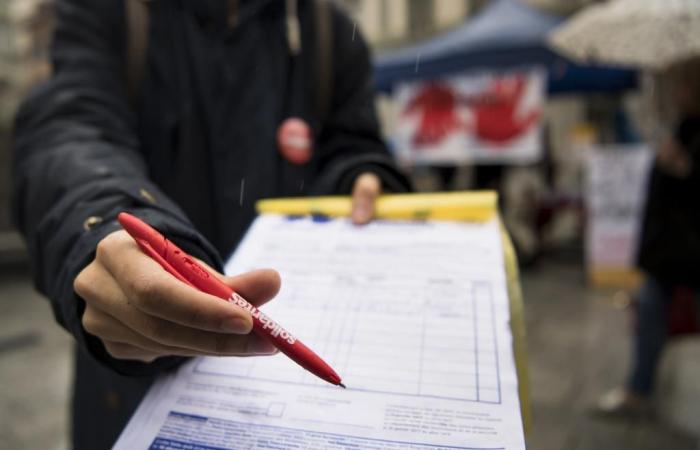Direct democracy –
The Federal Council does not want to ban paid signature collections
The ban on paid collection of signatures could restrict access to popular rights for certain actors, believes the Federal Council.
The government also rejects a whole series of other measures related to the collection of signatures.
KEYSTONE/Jean-Christophe Bott
Subscribe now and enjoy the audio playback feature.
BotTalk
The Federal Council still opposes the ban on paid signature collection for initiatives and referendums. He also does not want to enshrine stricter transparency requirements in law at the moment. This is his response to several interventions by Parliament.
A complete ban on the paid collection of signatures could restrict access to popular rights for certain actors, the government wrote on Wednesday in its position on two motions from State Councilor Baptiste Hurni (PS/NE) and National Councilor Céline Widmer (PS/ZH).
The Federal Council argues that collecting signatures for remuneration by external parties can be more advantageous for financially weak committees than, for example, a mass mailing of signature sheets with large distribution losses.
A ban on paid collections could result in only groups with established structures reaching the necessary number of signatures.
In its response to a motion by States Councilor Carlo Sommaruga (PS/GE), the government also opposes the mandatory publication of the amounts spent by committees for signatures.
The right of access already exists
The Federal Council also rejects a whole series of other measures relating to the collection of signatures. Thus, he does not want to include in federal law that citizens can ask the municipality if their signature appears on a collection sheet. This is what a motion from national councilor Martin Candinas (Center/GR) calls for.
The Federal Council recalls that cantonal data protection laws already provide for a right of access to personal data. Furthermore, this right of access is protected by fundamental rights.
The parliamentary interventions are motivated by revelations made in September, when the media reported potentially illegal practices on the part of paid signature collectors, particularly in French-speaking Switzerland, and alleged falsified signatures. The case sparked a debate on new rules in this area.
Reference to the round table
Around twenty interventions were submitted, including that of State Councilor Johanna Gapany (PLR/FR), who calls for a new law to strengthen transparency, and that of national councilor Jean Tschopp (PS/VD), who wants the companies concerned are subject to authorization.
The Federal Council also recommends the rejection of these motions, considering that legislative measures are only indicated if the measures already put in place by the Federal Chancellery are not effective. This includes a round table to develop a code of conduct for signature collections in collaboration with initiative committees, collection organizations, parties, interest groups and authorities.
Electronic route as an alternative
On the other hand, the Federal Council sees in the collection of signatures electronically a possibility to resolve the problem. It wants to allow limited practical trials of electronic collection for grassroots initiatives. To do this, he tasked the Federal Chancellery with a preliminary draft which must prepare such tests.
For this reason, the Federal Council recommends the adoption of several motions of the same content emanating from the parliamentary groups of the PLR, the Center, the Greens and the PS, which request such pilot tests. However, he rejects two broader motions from State Councilor Benjamin Mühlemann (PLR/GL) and National Councilor Greta Gysin (Greens/TI), which call for a rapid introduction of electronic signature collection.
“Latest news”
Want to stay on top of the news? “24 Heures” offers you two appointments per day, directly in your email box. So you don’t miss anything that’s happening in your Canton, in Switzerland or around the world.
Other newsletters
Log in
ATS
Did you find an error? Please report it to us.
4 comments






